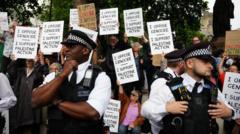Will Australia's PM Take Strong Action Against Synagogue Arson?

Understanding the Rising Tide of Antisemitism in Australia
The recent arson attack on a synagogue in Melbourne has sent shockwaves through the Australian community, illuminating a troubling trend of antisemitic acts that have intensified in the wake of global geopolitical tensions. Prime Minister Anthony Albanese’s pledge to confront this issue head-on underscores the urgency of the situation. This article will delve into the factors contributing to the surge in antisemitism in Australia, the implications of such violence, and the government's response to combat hate crimes effectively.
The Incident: A Catalyst for Change
On a seemingly ordinary Friday night, a man committed an egregious act by pouring liquid on the synagogue's front door and igniting a fire. This shocking event unfolded while 20 patrons were dining inside, all of whom were safely evacuated without injuries. However, the immediate threat to life was just one aspect of a larger, more insidious issue.
Link to Other Antisemitic Attacks
Police are investigating potential links between the synagogue arson and an attack on a Jewish-owned restaurant, Miznon, that occurred on the same night. Rioters stormed the establishment, hurling chairs and chanting slogans against the Israeli Defense Forces (IDF). The emergence of such violent incidents raises concerns about the safety of Jewish communities in Australia.
The Broader Context of Antisemitism
Australia has witnessed a troubling rise in antisemitism over recent months, often attributed to the escalating tensions surrounding the Israel-Hamas conflict. This situation has led to a polarized environment, where both Jewish and Muslim communities are feeling the impact of increased hostility.
Statistics and Trends
Reports indicate a significant uptick in antisemitic incidents across Australia. Key statistics include:
- A reported increase in hate crimes targeting Jewish individuals and institutions.
- Heightened levels of online antisemitic rhetoric and harassment.
- Increased visibility of antisemitic symbols and slogans during protests.
Such alarming trends highlight the urgent need for a comprehensive strategy to address the root causes of antisemitism and hate-based violence.
The Government's Response: A Commitment to Action
In light of these events, Prime Minister Albanese has emphasized that antisemitism has no place in Australia. His administration has taken several steps to tackle this pressing issue:
Appointment of a Special Envoy
The Australian government has appointed a special envoy dedicated to combating antisemitism. This role is designed to ensure that the voices of the Jewish community are heard and that their concerns are addressed at the highest levels of government.
Legislative Measures Against Hate Crimes
In response to the wave of antisemitic incidents, tougher laws have been enacted to combat hate crimes. These measures aim to provide law enforcement with the tools necessary to investigate and prosecute hate-based violence effectively.
Community Reactions: Voices of Concern
The Jewish community in Australia has expressed deep concern over the recent incidents. Alex Ryvchin, co-chief executive of the Executive Council of Australian Jewry, stated that these attacks represent a severe escalation targeting their community. Such sentiments reflect a collective anxiety regarding safety and security in a society that has long prided itself on multiculturalism and tolerance.
International Perspectives
Internationally, Israeli officials have recognized the seriousness of the situation. Israel's Foreign Minister, Gideon Saar, urged the Australian government to intensify its efforts in combating what he termed a “toxic disease.” This call for action resonates not only within Australia but also underscores the global implications of rising antisemitism.
The Impact of Geopolitical Conflicts
The ongoing conflict in the Middle East has become a significant political issue in Australia, affecting relationships between various communities. The violence and loss of life in Gaza, particularly since the 7 October 2023 attacks, have led to heightened emotions and division within Australia. With over 57,000 lives lost in Gaza, the humanitarian crisis has further complicated the discourse surrounding antisemitism and Islamophobia.
Protests and Tensions
Protests have erupted from both Jewish and Muslim communities, highlighting the complexities of the situation. While these protests often aim to express legitimate grievances, they have also sometimes devolved into displays of hatred and violence. This pattern of unrest has exacerbated existing tensions, making it increasingly difficult to foster a sense of community and understanding among diverse groups.
Moving Forward: Strategies for Prevention
To effectively combat rising antisemitism and foster a more inclusive society, Australia must adopt multifaceted strategies aimed at education, community engagement, and legislative reform.
Education and Awareness Programs
Education is a powerful tool in the fight against hate. Implementing programs that promote understanding and respect for diverse cultures can help dismantle stereotypes and prejudices. Schools and community organizations play a crucial role in this effort, fostering dialogue and empathy among students and community members alike.
Strengthening Community Ties
Building bridges between communities is essential for fostering a sense of unity. Initiatives that encourage collaboration between Jewish and Muslim organizations can help to create a more harmonious environment. Community events, interfaith dialogues, and joint charitable projects can serve as platforms for healing and understanding.
Enhancing Law Enforcement Training
Law enforcement agencies must be equipped to handle hate crimes effectively. Training officers to recognize and respond to antisemitic incidents is vital for ensuring that victims receive the support they need. Additionally, enhancing reporting systems for hate crimes can help authorities track and address these issues more effectively.
Conclusion: A Call to Action
The recent attacks on Jewish institutions in Australia have underscored the urgent need for a collective response to antisemitism. The government’s commitment to addressing this issue is a necessary first step, but it requires the involvement of all Australians to create lasting change. By fostering understanding, promoting dialogue, and standing united against hate, Australia can move towards a future where diversity is celebrated and all communities feel safe and valued.
FAQs
What is antisemitism, and how does it manifest in society?
Antisemitism refers to hostility or prejudice against Jewish individuals or communities. It can manifest in various forms, including discriminatory laws, hate speech, violence, and social exclusion.
What steps can individuals take to combat antisemitism?
Individuals can combat antisemitism by educating themselves and others about Jewish culture and history, standing against hate speech, and supporting organizations that promote tolerance and understanding.
How can communities work together to prevent hate crimes?
Communities can prevent hate crimes by fostering dialogue between different cultural groups, organizing events that celebrate diversity, and creating safe spaces for discussions about prejudices and social issues.
As we reflect on these recent events, it is essential to consider how we, as a society, can come together to combat hate and promote understanding among all communities. What steps do you believe are necessary to create a safer, more inclusive environment for everyone? #Antisemitism #CommunityUnity #HateCrimePrevention
Published: 2025-07-05 10:00:10 | Category: world



